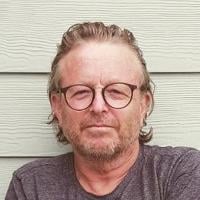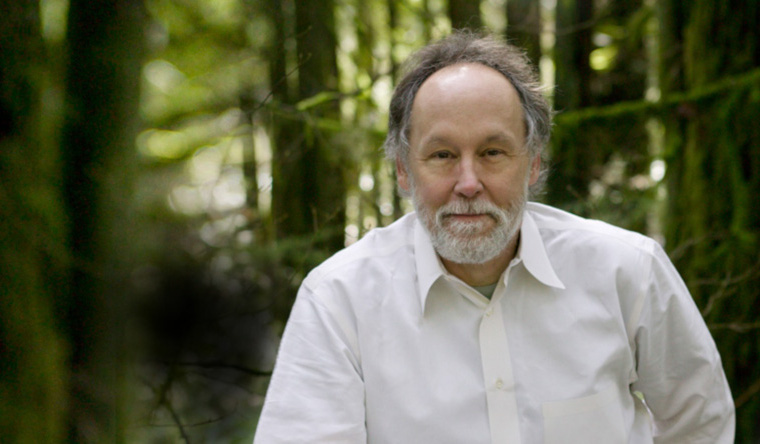[Editor’s note: On Monday, March 25, renowned author Barry Lopez will appear at a Vancouver Writers Fest event in conversation with Tyee columnist and contributing editor Ian Gill.
Lopez, perhaps best known for his ground-breaking book Arctic Dreams, has written a deeply reflective new work, Horizon. While he sees hope for the world, he also fears the path we are on. In advance of their conversation, Gill reached Lopez at his home in the McKenzie River Valley in rural Oregon, where he has lived for 49 years. This is a distillation of that conversation.]
The Tyee: In Orion magazine, Rebecca Solnit once quoted the poet and bioregionalist Gary Snyder who said, “The most radical thing you can do is stay home.” She wrote that “in the bioregional 1970s, going back to the land and consuming less was how the task was framed... The task has only become more urgent as climate change in particular underscores that we need to consume a lot less... We are going to have to stay home a lot more in the future.” Is she right? Was Gary Snyder right?
Barry Lopez: They are both right in a sense. It’s important to maintain an international awareness of global problems like methane gas releases and climate change. It’s hard as an American now that we’ve pulled out of the Paris accords not to be embarrassed abroad. But it’s important to get outside the bounds of your own nation state, to see what people are experiencing, and to report on what they are doing about it. If you are not in the Arctic, you simply cannot understand the staggering change that we are experiencing through climate change.
Nevertheless, I do think there is wisdom in staying put. People have asked me before, “How can you write so much about community when you are away so much?” And then I thought about chinook salmon returning to the McKenzie River. I’m very attentive to the chinook, and it struck me one day that chinook salmon are part of the community here, it just happens that they’re out in the North Pacific most of their lives. They are gone quite a bit, but out there they’re learning a lot about community.
When I travel, when I think about where I most want to be, I want to go home. Here is where I’ve had the longest conversation with the non-human world. Every day I’m home I’m out in the forest, I am a witness to its life. Right now, I’m living in a temperate rainforest where it no longer rains, and fire season is longer. Everything gets shaken up.
When people travel, given how huge their carbon footprint is, I’d just say, “If your footprint is going to be that big, then you’d better be doing something for all of us, not just yourself.”
Is the day of the explorer essentially over? Is there anywhere left to go in the world that hasn’t been gone to? Is there anything left to find?
Oh my god yes. A few years ago [the eminent Harvard biologist] E.O. Wilson — we’re friends — well, he had just come from a meeting at the National Geographic Society and someone had asked that. Ed put his hand to his forehead, and said, “Can you imagine such a question?”
Anyway, no, there’s never going to be an end to discovery. Every summer I sit here reading, and every summer, without fail, a bug I’ve never seen before comes trundling across the open pages of my book. Look at the recent discovery of a subspecies of orca in the southern ocean. In the State of California, an average of two reptiles a year are discovered.
So no, it’s not all known.
I think the better answer to the question is who did the exploring? How much was done by James Cook, for example? Or somebody who was exploring a much larger world, which was Humboldt? Who’s doing the exploring, who is contemplating or having a deep discussion with a place? Who offers a different epistemology, a different way of knowing the world? No, there’s never going to be an end to discovery.
One person I think of is Robert Macfarlane, author of Mountains of the Mind: A History of a Fascination and, more recently, Underland: A Deep Time Journey — such an astute observer of landscape and of the natural world. He’s 30 years younger than I am, someone who is part of something that is going to continue to have a history.
You’ve acknowledged that you’ve had to wrestle with your conscience about having written about places like the Arctic, thereby popularizing them and spurring an onset of curiosity seekers whose attention threatens more and more remote places. Where do you find your own balance around this issue?
This is always a question for me. Back in the 1980s, there were some wealthy people — they were from Vancouver, actually — and I was on an archaeological dig on Skraeling Island [in the Arctic] and there were these tourists there. Someone came up to me and talked to me about Arctic Dreams. Then the fellow who was leading the expedition approached me and said, “This book of yours has created an industry for me.”
I’ve seen things I would never report, because I know they would be unnuanced no matter how carefully I wrote about them. If I wrote about some of what I’ve seen, it would reinforce people’s bigotry and racism because it would compromise people who took me into their world.
And then there are specific sites. I was once taken to see a ground glyph, which was a series of cobbles that had been arranged to make an outline of a horse. When I wrote about it, I lied about where it was, which was a very difficult thing to do. I made a professional decision to misrepresent where it was because I was worried that people would find it and wreck it.
There’s a footnote in the book where I admit that I gave the wrong coordinates for Jackal Camp (in eastern equatorial Africa). The coordinates are approximate, in order to protect the search area that I was writing about.
Writers and adventurers (and tourists) aren’t the only global explorers. Energy, mining and logging companies, in particular, are pushing farther into more and more remote lands and waters. Is there any prospect of slowing the industrialization of the entire world?
Oh Ian, that is my prayer. It’s important to find a very direct answer to this question and yet not be a painter of doom. Outside the tourist circle in the world, you come face to face with enormous economic power. In Australia, after [the economic slump of] 2008, every Australian state was in the red except Western Australia, where they were digging the hell out of the Pilbara and sending iron ore to China. The scale of it was just enormous. I saw it and I thought, “My god, are you kidding me?” When I came back home from Australia, it dawned on me this is happening everywhere. Hitting the brakes on it, I don’t know what it’s going to take.
The only thing you can’t do in public is to destroy people’s sense of hope. There are things we know that we don’t bring into conversation. You’ve got to take care with what you say. Where am I going to go to keep my own sense of possibility alive?
I don’t think people know what it takes to protect our species, to protect diversity. Those people trying to do that, theirs is holy work in emergency times. They know what the stakes are and its ferociously tough work.
Do you think the environmental movement has failed us? If so, why?
I wouldn’t say failed. The flaw in every model about climate change, for instance, is not that they were wrong about it happening, but they were completely wrong about the rate of acceleration. The speed of change is more than people could have intellectually coped with. And then when you have ruthless, unethical businessmen like Donald Trump running the show, deciding who gets the money, you’re in terrible trouble. I think generally the environmental movement has done pretty well, although I worry that it is increasingly full of administrative people who aren’t aware of what’s going on on the ground.
I think the environmental movement has always had to be savvy about being gentle in its messaging. People have a need to put food on the table and make their car payments and you can’t be angry about that. And if you are, they can’t comprehend your rage. Still, there is a catastrophe right in front of us that’s about to explode.
A lot of people place their faith in Indigenous communities making better decisions about resource use than Western society has proved capable of doing. Do Indigenous people have insights we can learn from? If so, can those insights be applied at a scale that would make a difference?
I think we can learn from them. What distinguishes our way of going about things, and native peoples’ — they are talking about an entirely different process. In a democracy, everyone gets to speak, but the systems are run by bureaucrats with their own bailiwicks and an agenda that demands that they must prevail. In traditional settings, the policy discussions and decisions must serve everyone. Indigenous people don’t have all the answers any more than we do, but what they have is a trust in processes to get to the right answer.
In traditional societies, what is uppermost in your mind is not progress, but stability. Seeing that the boat doesn’t turn over. In Indigenous communities there are people, real elders, who are lightning quick in seeing patterns of what works and where risks are. This wisdom of these elders is their appreciation of complex patterns. They can see where trouble lies, and where things you are worrying about aren’t worth worrying about at all.
How important is it for us, as a species, to understand our own diversity, and to take down, not build, barriers between us?
If you’re an evolutionary biologist you understand the importance of diversity. An entrenched belief in white culture is that a hierarchical structure is best. That’s just flat out what one of the problems is. It makes Western societies more bigoted than they think they are.
I don’t see very much, as I travel, that makes me hopeful about changing human behaviour enough to make a future for our children. I set myself a task of educating businessmen on what the problems are. Capitalism? We’re done with it. It destroys, it kills people all over the world. What comes after democracy, what comes after capitalism? The answer will be one that most people will reject, but it will be the right answer.
Do you think we have a shot at stability (if not progress!) in the next 40 years?
I would say no, but it’s important to act as if it’s possible. We have to stand up for what we believe civilization stands for, even if it’s gone off the rails. Perhaps you personally are doing well, but don’t you see you’ve taken up a space that used to be owned by many more species than homo sapiens? Fighting bigotry is at the centre of conservation work. We need to discover a social system that allows people to live with courtesy and compassion. ![]()
Read more: Rights + Justice, Environment
















Tyee Commenting Guidelines
Comments that violate guidelines risk being deleted, and violations may result in a temporary or permanent user ban. Maintain the spirit of good conversation to stay in the discussion.
*Please note The Tyee is not a forum for spreading misinformation about COVID-19, denying its existence or minimizing its risk to public health.
Do:
Do not: